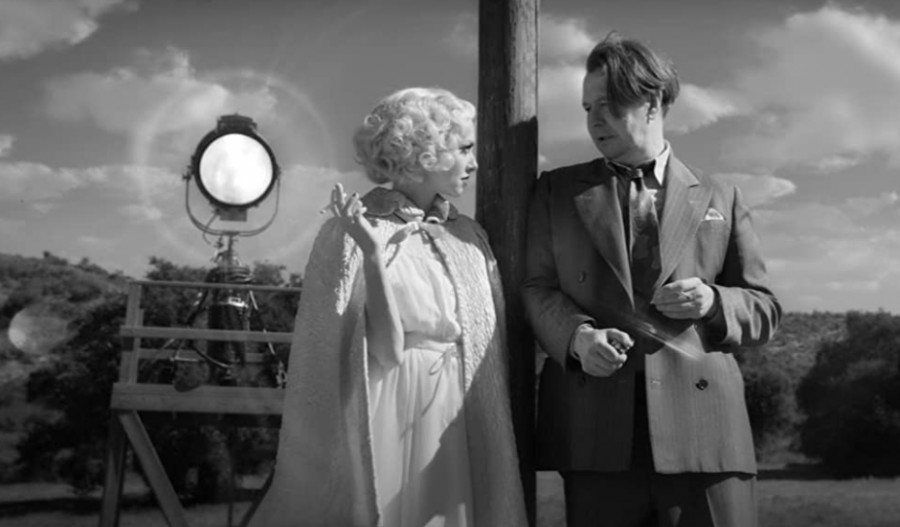REVIEW: ‘Mank’ is a thought-provoking look into one of history’s greatest films
IMDB for The DePaulia
Still of Amanda Seyfried and Gary Oldman in “Mank.”
“Citizen Kane” rests firmly in the annals of time as a highly celebrated film, if not the single most celebrated film ever made. And rightfully so. Orson Welles’ debut feature film was a towering achievement of immense power and complexity, breaking barriers in regards to cinematic form and narrative structure in a way that set groundwork for filmmakers worldwide to express themselves in a more dynamic manner.
Not to mention, it’s existential and scathing portrait of the moral rise and fall of fictional media mogul Charles Foster Kane enraged news-empire head William Randolph Hearst who tried to stop the making of the film and its ensuing release from the then failing RKO Pictures.
Now almost 80 years later, every film student in the world knows how that turned out for Hearst because we’re forced to watch almost every year for a class.
“Citizen Kane” easily earned its spot on top of the rest but it wasn’t just Welles who got it there. No, this movie wouldn’t have happened at all if not for the tortured and impassioned work and history of screenwriter Herman J. “Mank” Mankiewicz, who now has his proper time in the sun as the focus of David Fincher’s new film “Mank.”
“Mank” stars Gary Oldman as the titular Academy Award-winning writer atop an amazing supporting cast featuring Amanda Seyfried, Lily Collins, Tuppence Middleton, Arliss Howard and Charles Dance. Fincher marks his return to feature films after a six-year hiatus with a script written by his late father, Jack Fincher.
Here, Fincher completely dons the style of a 1930s film complete with a crisp black-and-white cinematography and a rouring score. He also adopts the fragmented memoir style of “Kane” to tell the story of Mank’s rise and fall within a Hollywood system that grows more ideologically opposed to him. Mank struggles with alcoholism, a broken leg, familial drama, Welles breathing down his neck to finish “Kane” and a film industry that seems to encourage his artistic demise.
Oldman’s natural star power is at its peak here. His performance veers outside of being showy and instead finds a lot of painful truths in Mank’s career as a studio screenwriter. He makes drinking look painful but he makes the process of writing an award-winning screenplay look even more painful. Collins also lends a delightful turn as the responsible naive foil to Mank’s seasoned cynic.
Fincher keeps his usual edge and candor fully intact with this classical styling, but this is unquestionably his most niche film to date. It’s so deeply shrouded in the politics and machinations of the studio-driven Hollywood of the 1930s with snappy references and disarmingly topical commentary. Jack Fincher’s screenplay has a natural bite to it that gives every scene its own delightful crescendo. Fincher’s direction is as calculated and reassured as ever.
Fincher refuses to make Mank some tortured messiah artist who’s about to crank out his magnum opus. He’s merely a man who works within a system that disregards his belief — Hollywood at the time was in bed with the GOP and Mank was a dedicated socialist — and fights through his allegiance to shady figures such as Hearst to have his voice mean something.
Going into “Mank,” I feared that maybe it would result into being one of those films that we seem to get every year that didactically talks down to its audience and tells them “why they love movies.” You know, the ones where they plaster it on the movie’s poster like “The Artist” or “La La Land” or “Saving Mr. Banks.”
But Fincher takes a stand against that popularized notion and instead preaches the necessity of film and the uniquely sobering experience of collaboration among other things. Fincher has quite the scathing cynical eye for Hollywood in this film – which should surprise no one who has bothered to look at any of his press tour interviews for this film.
“Mank” has managed to do something for me that so few films have done, it made me think about film in a bit of a different light. The heart-aching process of it is illuminated in beautiful black-and-white here with all its rough-around-the-edges and political knives out glory.
Much like “Citizen Kane” when that came out, “Mank” is purely unconventional. No part of it was as you expect it to be and as stand-offish and inaccessible as it may seem at times, you may ultimately walk away from it with a far more profound affection for the art you see or read.











